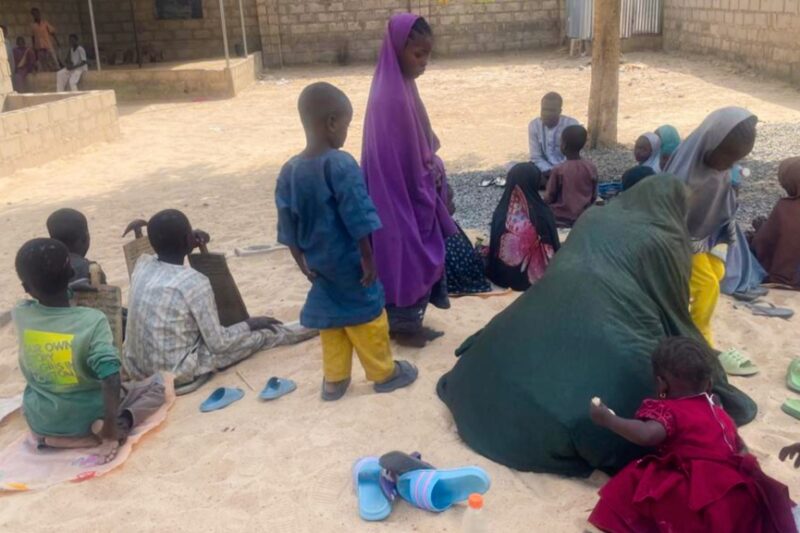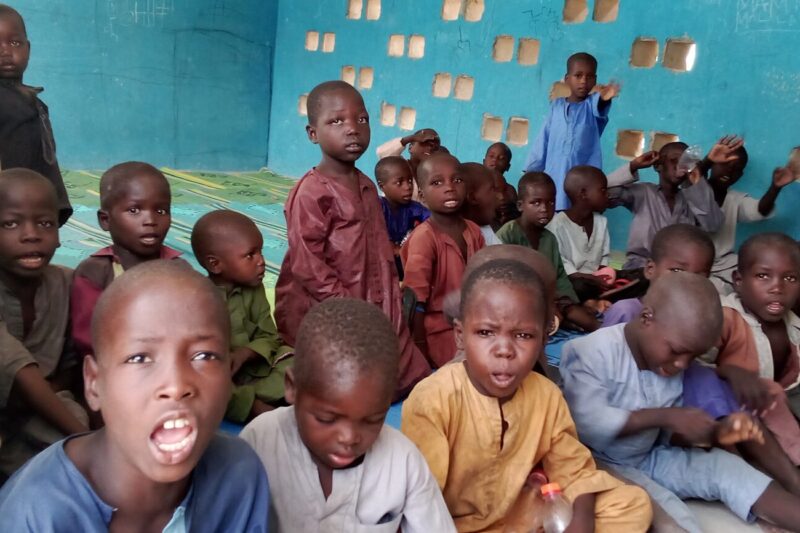Hope for the future as academic and philanthropist opens school for less-privileged kids, hoping to get out-of-school children – including girls and orphans – off the streets and into classrooms.
Thousands of children in Borno State have never been to school – instead, they roam the streets begging for money and food.
Many of these children are orphans who lost their parents in the Boko Haram insurgency. They are the products of almost 15 years of armed conflict in the state. They have suffered multiple displacements, poverty and insecurity. They have limited, if any, access to basic services.
Since the insurgency started in 2009, there have been numerous attacks on schools. Educational institutions were torched and destroyed. Thousands of teachers and students were abducted.
Atrocities committed by insurgents – members of the Jamā’at Ahl as-Sunnah lid-Da’way Wa’l-Jihād (JAS), more commonly referred to as Boko Haram, and its splinter group, the Islamic State West Africa Province (ISWAP) – on communities throughout Borno State has made it almost impossible for internally displaced children to get access to education.
But academic and philanthropist Mustapha Adam Kolo is trying to change all that.
His Adam Model Sangaya School was officially opened on Sunday, February 2. The school is for less privileged children, including girls and orphans.
Kolo, a senior lecturer in the department of geography at the University of Maiduguri, told RNI that he could no longer sit back and watch so many children roam the streets and waste their lives.
“Every child needs an education,” he said.
Scores of people, including top dignitaries and traditional rulers, attended the inauguration of the school in the 44G community near Molai in the Damboa Road area of Maiduguri.
Bulama Kundili Bukar, the ward head (Bulama) of 44G community, told RNI that the school would help to eradicate illiteracy and encourage out-of-school children to get an education.
“I urge parents and guardians to support the newly established school and protect it because the school now belongs to the whole community.
“I call on parents and guardians to enrol their wards or children in the school. It is crucial for all children to get an education, both Islamic and Western, which this school offers.
“Education is considered a key factor in creating a brighter future for individuals, communities and nations. It improves employability, income potential and personal growth.
“We have so many out-of-school children roaming streets. It is an issue that needs to be dealt with urgently.”
Hafsat Mohammed, a teacher at the school, emphasised the need for girls to get an education.
She said educated women were more likely to participate in the economy, contribute to community development and raise educated children.
She urged parents and guardians, particularly women, to encourage girls to go to school to acquire both Western and Islamic education.
“All members of the community, including the government, non-governmental organisations, philanthropists, parents and guardians need to address the issue of out-of-school children and to support the call for better education for girl children.
“To address the challenges of out-of-school children and to combat illiteracy, it is crucial for parents and guardians to play their role by enrolling their wards or children in school and ensuring that every child gets educated.”
Ba Gujbawo, an orphan who attends the Adam Model Sangaya School, told RNI that he was excited and could not wait to start learning.
“I have no parents, I lost them in the insurgency. No one took responsibility to ensure I got an education. Then I heard about this school. It’s free – I don’t have to pay a penny. Everything is free of charge. I am extremely happy to be in this school.”
Kolo said he had built the school for less-privileged children, who often missed out on getting an education.
“Without an education, their future is grim. The poverty cycle will continue.”
Kolo said there were about 40 orphans in the school, all of whom had lost their parents in the insurgency.
“It is these children who do not even have a family that really need help and encouragement. We want to get them off the streets where they beg for money and food. We want them inside our classrooms instead – gaining knowledge so that they will one day become productive and accomplished citizens.
“I built the school because I want to contribute to the development of the community by supporting orphans and less-privileged children and enabling them to get an education. Many individuals, philanthropists and government agencies have supported the school.
“The Borno State Arabic and Sangaya Education Board paid for a borehole to be drilled at the school and a wealthy individual pledged to install a solar system to ensure effective power supply.
“We hope to collaborate with more organisations and individuals. We want to expand the school so that we can help more children to find their path to a better future.”
SHETTIMA LAWAN MONGUNO








